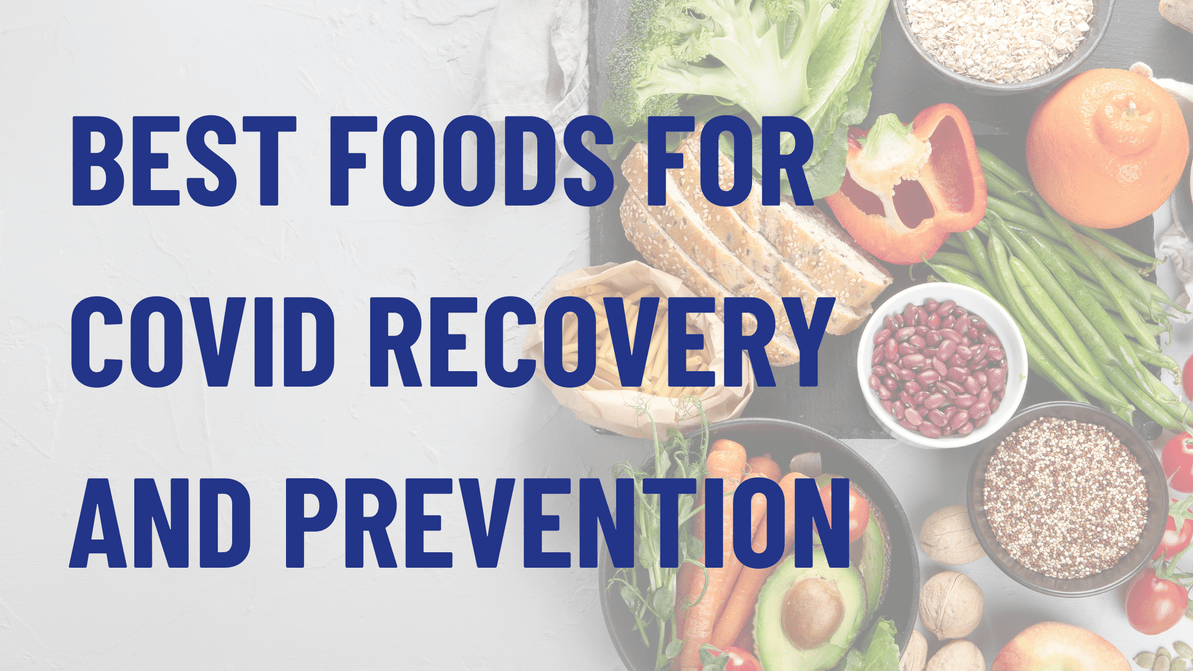Best Foods for COVID Recovery and Prevention
A few years ago, a new virus took the world by surprise. COVID-19 may look like the flu on the surface, but its symptoms can vary greatly. Recovery can take anywhere between a few days and months. We know foods can be great allies in fighting the common cold. So, people soon started wondering: What are the best foods for COVID recovery and prevention?
While no food can completely cure a disease or kill viruses instantly, your diet can boost your immune system, helping you fight diseases and recover faster.
Even though COVID has only been around for a few years, there’s already been a lot of research on this topic, so much so that it can all get a little confusing. Should you eat your weight in citrus to get that vitamin C? Do you go for an anti-inflammatory diet?
This article will help you make sense of it all so you can understand how and why foods can help boost your immunity and what the best foods for COVID recovery are.
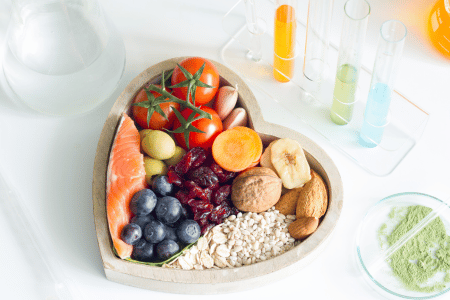
What is COVID?
COVID, also known as COVID-19, short for coronavirus disease 19, is caused by the SARS-CoV-2 virus.
Most people who contract the virus will have respiratory symptoms that can range from mild to severe. In some, it may feel like nothing more than a common cold, while others may end up battling pneumonia.
What’s different about COVID-19 is that it doesn’t always present with respiratory symptoms. For instance, some people have reported experiencing digestive issues, loss or taste of smell, and more.
Recovery usually takes 1-2 weeks. For some people, it can take longer, with extreme cases developing Long COVID. People with this condition can experience symptoms like chronic fatigue, headaches, anxiety, heart palpitations, insomnia, or brain fog for months or even years after the initial infection.
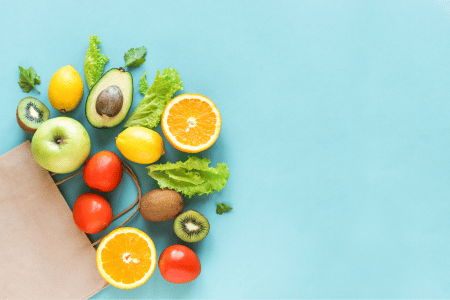
How foods can reduce symptoms and help you recover
Food is one of our bodies’ greatest allies. They can boost your immune system, keep inflammation at bay, and may help you recover faster from various infections.
Since the start of the COVID pandemic, there have been many myths about nutrition and the coronavirus. Luckily, there have also been many studies on this topic.
Plant-based diets seem to be the best way to prevent or recover faster from COVID-19. This is not a new observation. During the 1918 pandemic, those who ate a plant-based diet appeared to have a lower risk of catching the Spanish Flu. While research and statistics tools were not as advanced in those days, the pattern was still observed by many specialists.
At the opposite end of the spectrum sits diets high in meat and processed foods. The culprit appears to be inflammation. Diet-associated inflammation increases the risk of COVID-19 and other conditions like diabetes or heart disease.
Should you go vegan to recover or avoid COVID? Not necessarily. A vegan diet is not the only one that helps keep inflammation at bay. The Mediterranean diet is one of the world's most renowned anti-inflammatory diets. It is also the diet of many people living in Blue Zones, areas in the world where people are healthier and live longer.
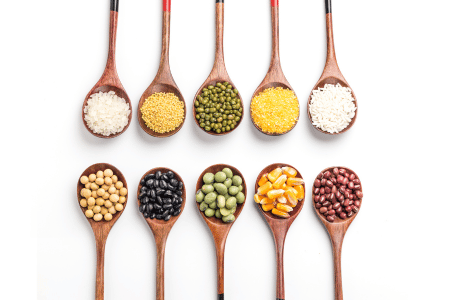
Here are key nutrients you should consider:
- Vitamins and minerals that abound in diets filled with fruits, veggies, and whole foods keep your immune system happy and functioning optimally. Pay special attention to foods high in vitamin C and zinc, but don’t ignore the others. A deficiency in any vitamin or mineral can lower your immunity and make you more prone to diseases.
- Omega-3 fatty acids have anti-inflammatory properties and can alleviate many COVID-19 symptoms.
- Fiber, present in fruits, veggies, and whole grains, promotes a healthy gut that contributes to your overall well-being, boosts your immune system, and can help with recovery.
- Probiotics and fermented foods are other ingredients for a healthy gut and immune system.
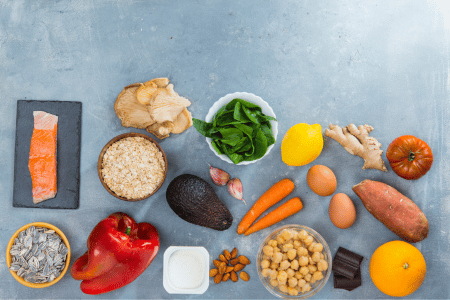
The best foods for COVID recovery
The keyword you’re looking for when thinking of the best foods for COVID recovery should be “anti-inflammator.”. In short, include as many fruits and veggies as possible, and “season” them with whole grains, seeds, beans, legumes, and fish to boost that omega-3.
Avoid or limit processed foods, meat (especially red meat), and saturated fats as much as possible.
Depending on your current diet, this list may seem very restrictive or full of variety. Regardless of how you feel about it, remember that starving yourself is never the goal, especially when recovering from a disease.
This is not a weight-loss diet; for some, it might come as a “side effect.” Let’s look at some of the best foods to include on your plate.
1. Fruits and vegetables
It might feel like we’re slightly cheating by including everything in this category. But naming just one or two fruits or veggies would be a disservice. Is there anything you should prioritize? Here’s a quick cheat sheet.
- Citrus fruits, such as oranges, grapefruit, or lemons, are high in vitamin C and are the ultimate cheerleaders of your immune system.
- Berries are high in vitamin C and have great anti-inflammatory and antioxidant properties, helping lessen symptoms and speeding up recovery.
- Leafy greens are rich in vitamins and minerals, have high levels of antioxidants, and are rich in fiber.
- Bell peppers provide another boost of vitamin C, but they also contain carotenoids, including beta-carotene, an antioxidant that can protect cells from damage.
- Cruciferous vegetables like broccoli or cauliflower have anti-inflammatory properties and are high in vitamins C and K, supporting your immune system and alleviating COVID-19 symptoms.
- Potatoes are not a common ingredient in “healthy foods” lists. They’re high in potassium, which can help your heart and muscles stay healthy. However, this is not an invitation to eat tons of fries. To get the most out of your potatoes, stick to boiling or baking them.
- Bananas are a good alternative to potatoes for potassium and one that won’t tempt you to turn them into junk food by frying them.
2. Whole grains
Grains like oatmeal, barley, brown rice, and quinoa have anti-inflammatory properties as well as prebiotic fiber, which supports gut health. Plus, they can often be the basis of a warm meal with a smooth texture that will do wonders for a sore, scratchy throat.
They’re even great for people who eat gluten-free. While common, some of these may contain traces of gluten, they’re easy to find in gluten-free versions, safe even for those with celiac or wheat allergies.
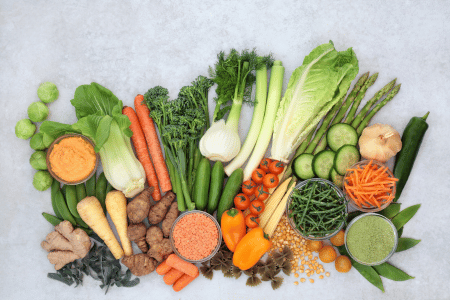
3. Green tea
Even though not a food in the real sense of the word, green tea is widely known for its antioxidant and anti-inflammatory properties. Plus, it keeps you hydrated—a must if you have COVID, especially if you run a fever.
It doesn’t have as much caffeine as black tea, but some people might need to avoid drinking it in the evening. In the second half of the day, you can replace it with other herbal teas that will help you stay hydrated without keeping you awake.
4. Fatty fish and seeds
Our list wouldn’t be complete without foods high in omega-3 fatty acids. Fatty fish like salmon or cod could help lower inflammation commonly associated with COVID-19 and, with it, the severity of your symptoms.
If you’re vegan or prefer not to eat fish, seeds, especially flaxseeds, are also good sources of omega-3. Plus, many nuts and seeds contain other vitamins and minerals, such as vitamin E, which can protect your cells from damage.
5. Legumes
One study showed that legumes, along with grains and other dietary fibers, can help lower the severity of COVID-19 symptoms.
Legumes are excellent protein sources without the extra inflammation that often comes with meat. They’re also rich in fiber, vitamins, and minerals, contributing to gut, immune system, and overall health.
Legumes also contain antioxidants such as flavonoids and polyphenols, which protect your cells and have anti-inflammatory properties.
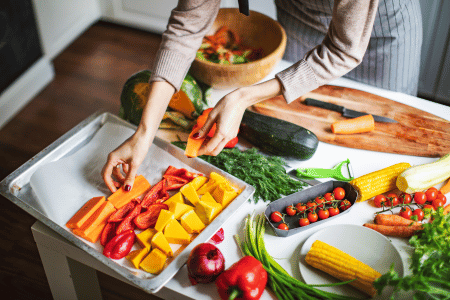
Key takeaways
No diet can protect you 100% from viruses. But what you eat can help boost your immune system, protect your cells against damage, and ensure your body functions optimally. All that can help you fight diseases more easily, recover faster, and have milder symptoms.
For COVID recovery and prevention, your priority should be an anti-inflammatory diet rich in fruits, veggies, whole grains, and omega-3 fatty acids. These will give your body all the resources it needs to fight this nasty virus and recover faster.
And if you’re looking for more ways to boost your immune system and potentially help with disease recovery and prevention, check out our blog post, 6 Easy Ways to Boost Your Immunity.
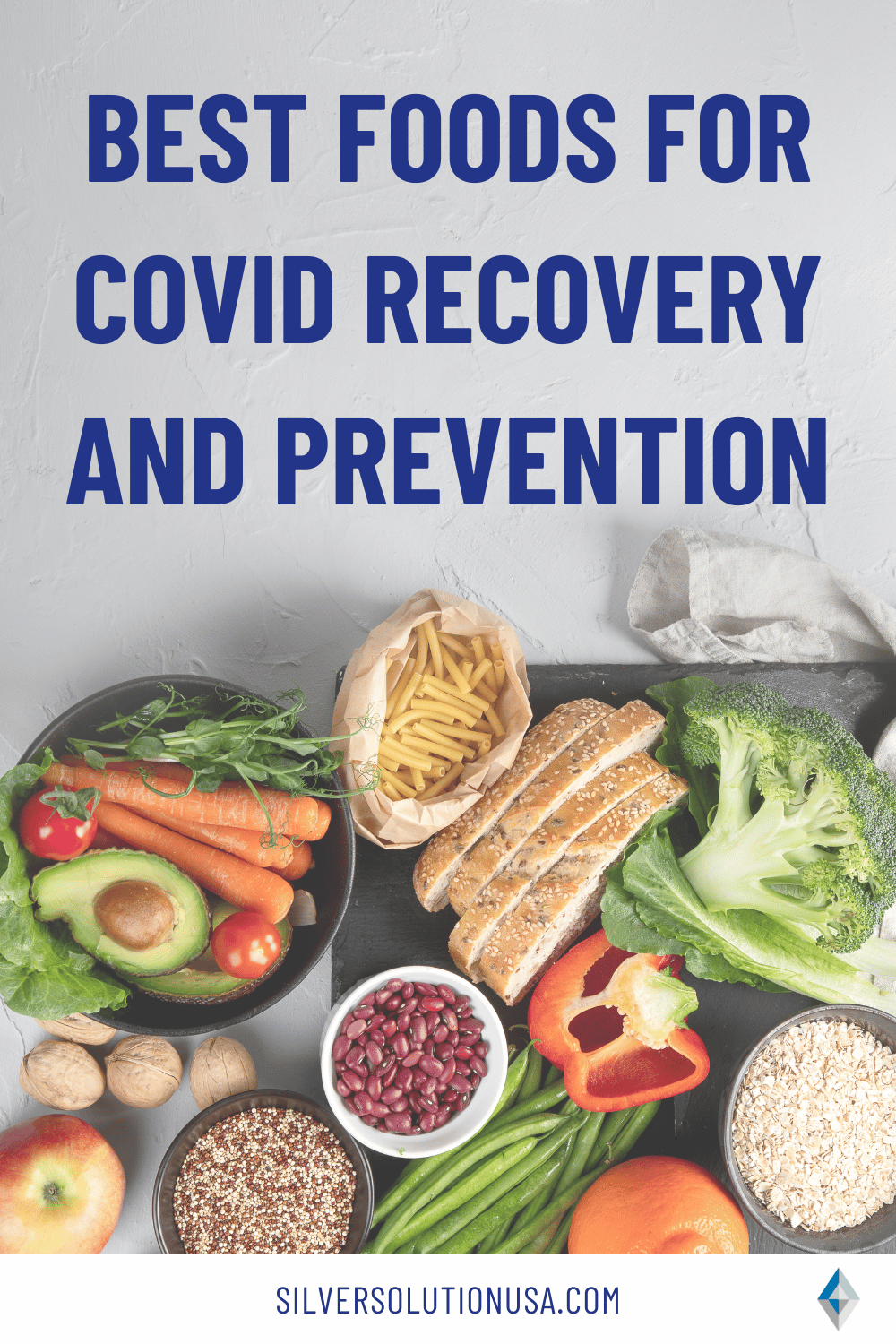
Health/Medical Disclaimer
This blog post does not provide health or medical advice. This blog post is for informational and educational purposes only and is not a substitute for professional health or medical advice. Before taking any actions based upon such information, we encourage you to consult with the appropriate medical and healthcare professionals. We do not provide any kind of health or medical advice. The use or reliance of any information contained on this blog is solely at your own risk.
Sources
https://www.cdc.gov/coronavirus/2019-ncov/your-health/about-covid-19.html
https://www.cdc.gov/coronavirus/2019-ncov/long-term-effects/index.html
https://www.ncbi.nlm.nih.gov/pmc/articles/PMC8472186/
https://www.news-medical.net/news/20211103/Anti-inflammatory-diets-in-COVID-19.aspx
https://pubmed.ncbi.nlm.nih.gov/34842636/
https://www.ncbi.nlm.nih.gov/pmc/articles/PMC7833284/
https://www.ncbi.nlm.nih.gov/pmc/articles/PMC7284818/
https://pubmed.ncbi.nlm.nih.gov/33117359/
Recent Posts
-
Are sunscreen ingredients harmful?
Sunny days can bring a lot of fun. Going out for a swim, spending time in nature, or relaxing on the …18th Mar 2024 -
The Veggie Debate: Does Cooking Vegetables Destroy Nutrients and the Best Ways to Cook Them
Vegetables are one of the healthiest foods you can choose. Some people downright hate them, while so …4th Mar 2024 -
Best Foods for COVID Recovery and Prevention
A few years ago, a new virus took the world by surprise. COVID-19 may look like the flu on the surfa …19th Feb 2024

